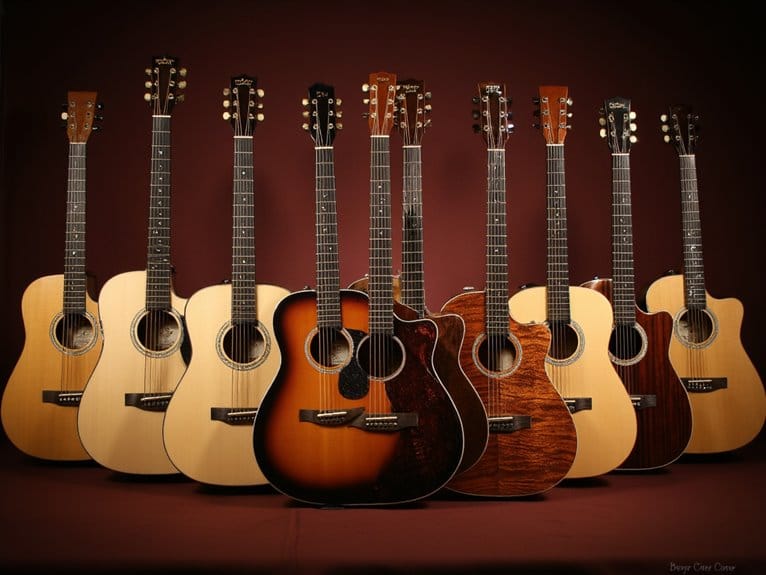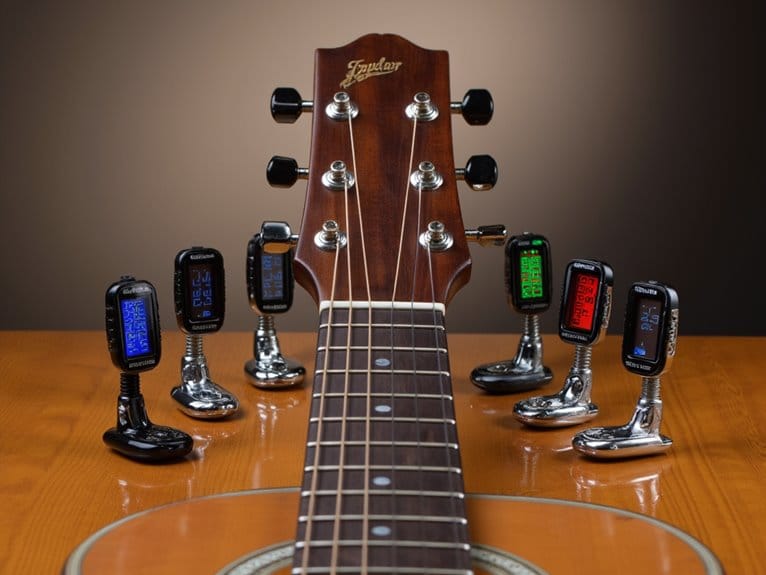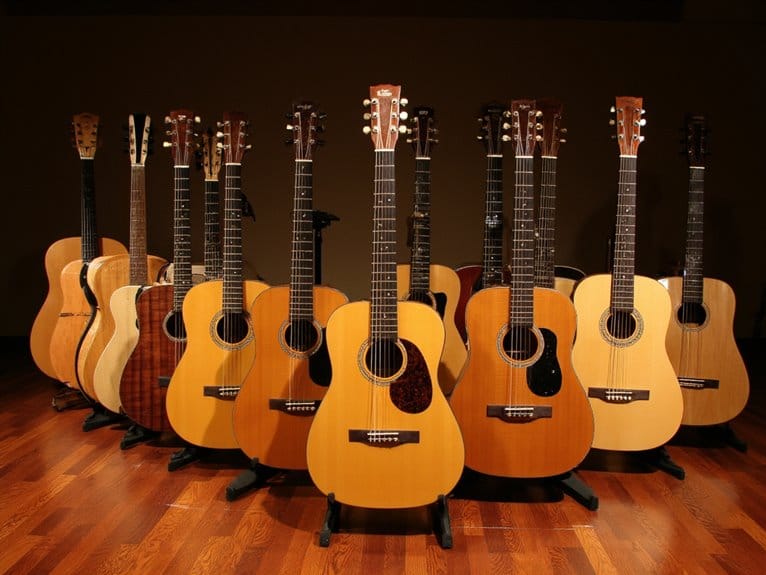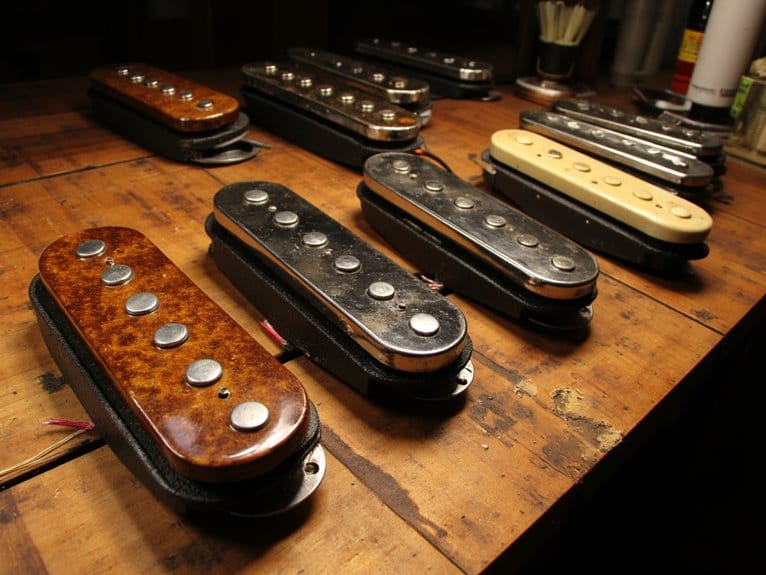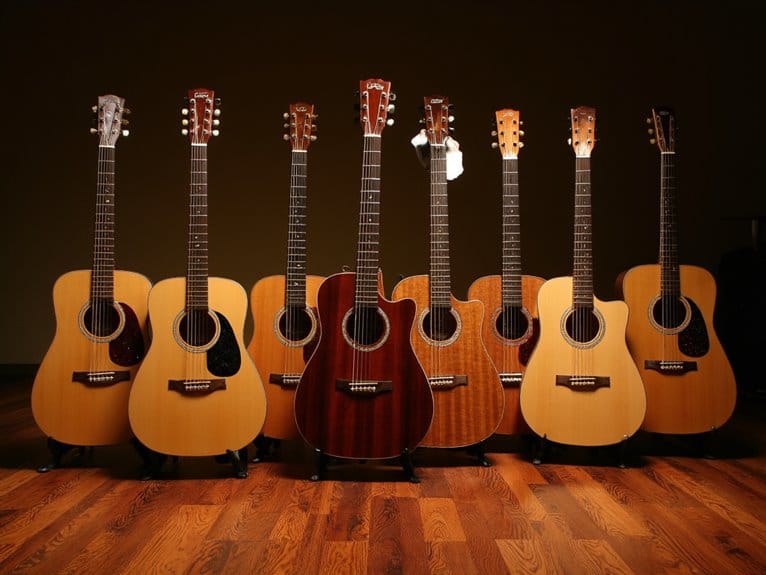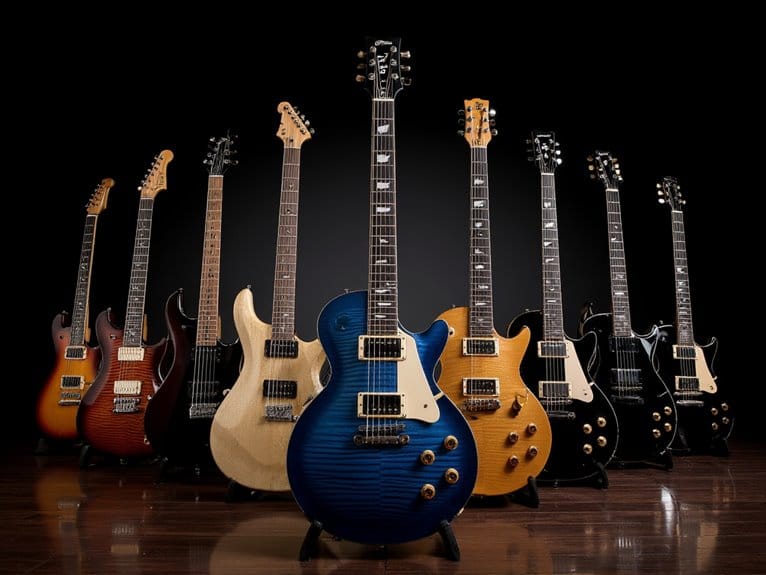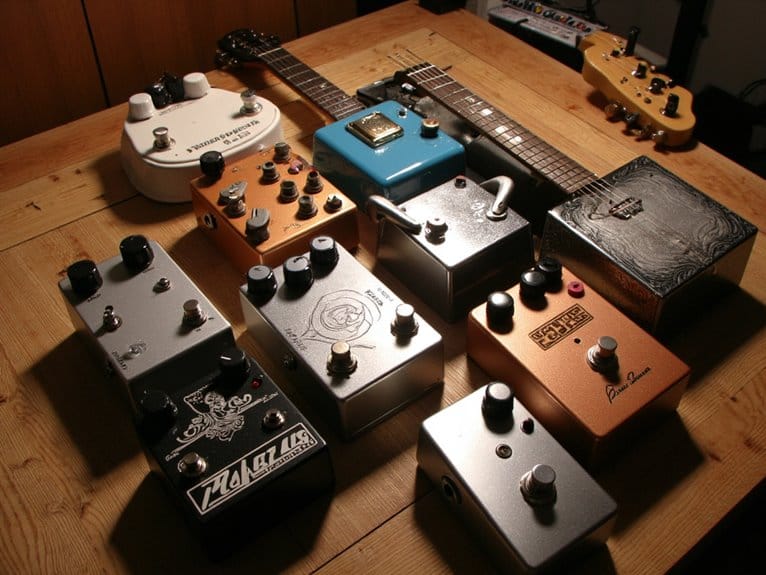10 Best Steel Strings for Acoustic Guitar
I’ve found that D’Addario’s 80/20 Bronze strings consistently deliver the brightest projection, while Elixir’s NANOWEB coating maintains that crisp tone for months longer than uncoated alternatives. For beginners dealing with finger soreness, I recommend Ernie Ball’s Silk and Steel strings, which reduce tension without sacrificing warmth. HAVENDI’s phosphor bronze options offer excellent rust resistance at budget-friendly prices, though D’Addario’s EJ16 phosphor bronze remains my go-to for balanced versatility across multiple playing styles, and there’s much more nuance to take into account.
We are supported by our audience. When you purchase through links on our site, we may earn an affiliate commission, at no extra cost for you. Learn more.
Notable Insights
- D’Addario 80/20 Bronze strings offer bright projection and excellent tuning stability, making them ideal for various playing styles.
- Elixir NANOWEB coated strings provide exceptional longevity, maintaining brightness for months while resisting sweat and corrosion damage.
- Ernie Ball Earthwood Silk and Steel strings reduce finger noise and tension, perfect for comfortable extended playing sessions.
- D’Addario Phosphor Bronze EJ16 strings deliver warm, balanced tones with corrosion resistance and have been popular since the 1970s.
- HAVENDI Phosphor Bronze strings feature rust-resistant coating and smooth playability, ideal for beginners and intermediate players seeking value.
HAVENDI Guitar Strings for Acoustic Guitar with Phosphor Bronze Coating

When you’re searching for acoustic guitar strings that deliver professional sound quality without breaking your budget, the HAVENDI Guitar Strings with Phosphor Bronze Coating represent what I’d call the sweet spot for both beginners and intermediate players who want reliable performance. These German-designed strings feature phosphor bronze coating that resists rust while maintaining durability, and honestly, I’ve found their SmoothFORCE design creates an unexpectedly buttery-soft playing experience that reduces finger pressure during extended sessions. The strings produce brilliant tones whether you’re playing gentle melodies or powerful chord progressions, and the included picks make this a complete package that eliminates frequent retuning headaches.
Best For: Beginner and intermediate acoustic guitar players seeking professional sound quality, comfortable playability, and durable strings that resist rust and maintain tuning stability.
Pros:
- Phosphor bronze coating provides excellent rust resistance and long-lasting durability
- SmoothFORCE design creates a buttery-soft playing experience that reduces finger pressure
- Complete package includes 6 strings and 3 picks, offering great value for the price
Cons:
- May not offer the premium sound quality that advanced professional players require
- Limited information about specific string gauges or tension options
- German design may come with higher costs compared to basic uncoated strings
HAVENDI Guitar Strings for Electric Guitar (6 String Set with 3 Picks)

HAVENDI’s electric guitar strings present an interesting case study in affordability meeting performance, though I’ll admit their marketing as steel strings for acoustic guitars creates some confusion since these are specifically designed for electric instruments. These steel strings with nickel coating deliver surprisingly solid performance for their price point, featuring extra light gauge construction that makes bending and vibrato techniques accessible to beginners while maintaining the responsiveness experienced players expect. The rust-proof design holds tuning stability remarkably well, and the included picks add practical value to the package, making this set a sensible choice for players seeking reliable strings without premium pricing.
Best For: Beginner to intermediate electric guitar players seeking affordable, reliable strings with good sound quality and tuning stability, especially those who want extra light gauge strings for easier bending and vibrato techniques.
Pros:
- Extra light gauge construction makes bending and vibrato accessible while maintaining responsiveness for experienced players
- Rust-proof nickel coating provides excellent tuning stability and corrosion resistance, especially in humid environments
- Great value package includes three picks and offers reliable performance at an affordable price point
Cons:
- Some users report isolated incidents of strings snapping during tuning, particularly the B string
- Marketing confusion as they’re sometimes advertised as acoustic guitar strings despite being designed for electric instruments
- Made in China which may concern players preferring strings manufactured in traditional guitar-making regions
DAddario Acoustic Guitar Strings – 80/20 Bronze (EJ11-3D Light, 12-53, 3-Pack)

D’Addario’s EJ11-3D 80/20 Bronze strings stand out as the premier choice for guitarists who prioritize bright, crisp projection and sparkling treble tones in their acoustic sound. Created through a collaboration between John D’Addario Sr. and renowned guitar maker John D’Angelico in the 1930s, these precision-wound strings feature a high carbon steel core wrapped with 80/20 bronze wire, delivering the bold projection that fills any room. With their light 12-53 gauge configuration, you’ll experience comfortable playability alongside remarkable depth and rich harmonics, while the superior tuning stability keeps you playing rather than constantly adjusting.
Best For: Guitarists seeking bright, crisp acoustic tones with sparkling treble response and reliable tuning stability for both practice and performance.
Pros:
- Exceptional brightness and projection with rich harmonics that fill the room
- Superior tuning stability reduces time spent adjusting and more time playing
- Light gauge (12-53) provides comfortable playability while maintaining full sound
Cons:
- Bright tone may be too trebly for players preferring warmer, mellower sounds
- 80/20 bronze strings typically have shorter lifespan compared to coated alternatives
- Light gauge may not provide enough tension or volume for heavy strumming styles
Ernie Ball Earthwood Silk and Steel Extra-Soft Acoustic Guitar Strings (P02047)

Comfort becomes paramount when you’re dealing with finger pain, arthritis, or simply starting your acoustic guitar journey, and Ernie Ball’s Earthwood Silk and Steel Extra-Soft strings deliver exactly that relief through their ingenious 80/20 bronze construction wrapped with silk fibers. The 10-50 gauge set produces surprisingly warm, mellow tones while dramatically reducing finger noise and tension, making extended playing sessions achievable without the usual fingertip punishment. You’ll appreciate how the silk layer creates a gentler playing experience, though you’re trading some volume and brightness for comfort-a worthwhile compromise that’s earned these strings a 4.6-star rating from nearly 4,000 users.
Best For: Beginners, players with finger pain or arthritis, and guitarists returning after a break who prioritize comfort and reduced finger fatigue over maximum volume and brightness.
Pros:
- Silk wrap dramatically reduces finger noise and provides gentler feel on fingertips, enabling longer playing sessions
- Warm, mellow tone quality with good balance between crisp trebles and snappy bass sounds
- Lower string tension makes difficult chords easier to play, particularly beneficial for those with hand conditions
Cons:
- Reduced volume and brightness compared to standard acoustic strings due to the silk wrapping
- Some users report needing to upgrade to higher gauges (.11) for better tension and less finger noise
- Trade-off in high-end brightness may not suit players seeking maximum acoustic projection
Elixir Acoustic Guitar Strings, 80/20 Bronze with NANOWEB Coating (Light 12-53)

When you’re searching for acoustic guitar strings that’ll maintain their sparkle and playability for months rather than weeks, Elixir’s 80/20 Bronze strings with NANOWEB coating represent what I consider the gold standard for longevity-focused players. The ultra-thin NANOWEB coating protects against sweat, corrosion, and humidity while preserving the bright, focused tone that 80% copper, 20% zinc bronze construction delivers. You’ll notice these strings retain their out-of-the-box brightness remarkably longer than uncoated alternatives, though they start quite vibrant and mellow naturally over time. With anti-rust plating on plain steel strings and consistent performance across various playing styles, they’ve earned their #3 ranking in acoustic guitar strings.
Best For: Guitarists who prioritize string longevity and consistent tone retention, especially those who play frequently or live in humid climates where standard strings deteriorate quickly.
Pros:
- Exceptional durability with NANOWEB coating that protects against sweat, corrosion, and humidity for months of consistent performance
- Retains bright, vibrant tone significantly longer than uncoated strings while maintaining the focused sound of 80/20 bronze construction
- High customer satisfaction with 4.8/5 stars across over 36,000 ratings and smooth, comfortable playability
Cons:
- Initial brightness may be too vibrant for players who prefer a warmer, mellower tone from the start
- Higher price point compared to standard uncoated acoustic guitar strings
- Some players may prefer the natural feel and sound evolution of uncoated strings over the consistent coated performance
DAddario Phosphor Bronze Acoustic Guitar Strings (EJ16)
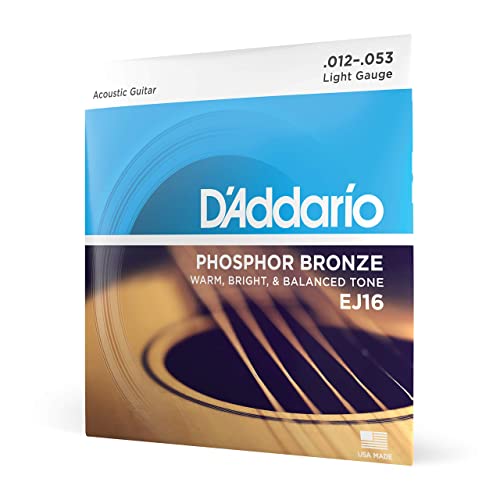
Since the 1970s, these phosphor bronze strings have maintained their position as the market’s most popular choice, and frankly, it’s easy to understand why once you experience their consistently balanced performance across multiple musical styles. D’Addario’s EJ16 set combines precision-wound phosphor bronze wrap wire with a hexagonal high-carbon steel core, creating strings that deliver warm, full-spectrum tones whether you’re strumming folk ballads or fingerpicking jazz progressions. The 12-53 light gauge provides comfortable playability without sacrificing the rich resonance that phosphor bronze construction naturally produces, while the corrosion-resistant design guarantees these strings maintain their tonal clarity longer than standard bronze alternatives.
Best For: Acoustic guitarists of all skill levels who want versatile, long-lasting strings that deliver warm, balanced tones across multiple musical genres from folk to jazz.
Pros:
- Warm, full-spectrum tone quality with rich resonance that works well across all musical styles
- Corrosion-resistant phosphor bronze construction provides longer string life than standard bronze strings
- Light 12-53 gauge offers comfortable playability while maintaining excellent tonal depth
Cons:
- May be more expensive than basic bronze or brass-wound alternatives
- Light gauge may not provide enough tension or volume for players who prefer heavier strings
- Phosphor bronze material can feel different to players accustomed to other string materials like 80/20 bronze
HAVENDI Guitar Strings for Acoustic Guitar with Phosphor Bronze Coating (Includes 3 Picks)

HAVENDI’s acoustic guitar strings stand out as an exceptional choice for beginners who need a gentle introduction to playing without sacrificing sound quality, thanks to their SmoothFORCE design that delivers what the company calls a “buttery-soft” playing experience. The phosphor bronze coating provides rust resistance and durability, which means you’ll spend less time retuning and more time actually playing. While I appreciate the German engineering approach to sound quality, what impressed me most was how these strings produce brilliant tones for both gentle melodies and powerful chords, plus you get three picks included.
Best For: Beginners seeking a gentle introduction to acoustic guitar playing without compromising on sound quality, and players who want durable, rust-resistant strings that stay in tune longer.
Pros:
- SmoothFORCE design provides buttery-soft playing experience that reduces finger pressure, making it ideal for beginners
- Phosphor bronze coating offers excellent rust resistance and durability, requiring less frequent retuning
- Produces brilliant tones suitable for both gentle melodies and powerful chords, with German-engineered quality standards
Cons:
- No specific gauge options mentioned, which may limit customization for different playing styles
- Higher price point compared to basic uncoated strings may not suit budget-conscious players
- Limited information about string tension specifications for players who prefer specific feel characteristics
Ernie Ball Earthwood Extra Light 80/20 Bronze Acoustic Guitar Strings (P02006)

The Ernie Ball Earthwood Extra Light 80/20 Bronze strings stand out as an exceptional choice for beginner guitarists and players with smaller hands who need reduced string tension without sacrificing tonal quality. These 10-50 gauge strings deliver a bright, balanced tone with excellent projection and clarity, making them ideal for fingerpicking and strumming techniques. The wound strings feature 80% copper and 20% zinc wrapped around high-carbon steel cores, creating durability without harsh finger pressure. Ernie Ball’s Element Shield Packaging extends string life considerably, maintaining freshness until you’re ready to restring. Manufactured in California using premium materials, these strings offer reliable performance for practice sessions and performances.
Best For: Beginner guitarists, players with smaller hands, and musicians who prefer easier fretboard playability without compromising on bright, balanced tone quality.
Pros:
- Extra light gauge reduces string tension for comfortable playing and easier fretting
- Bright, balanced tone with excellent projection and clarity ideal for various playing techniques
- Element Shield Packaging extends string life and maintains freshness
Cons:
- Lighter gauge may produce less volume and bass response compared to heavier strings
- May not provide the fuller, richer tone preferred by experienced players seeking maximum projection
- Extra light strings may be more prone to breaking under aggressive playing styles
Acoustic Guitar B Strings (5 Pack Steel String Replacement)

Beginners often struggle with string replacement, but these Acoustic Guitar B Strings offer a practical solution with their 5-pack design that guarantees you’ll have multiple backup strings when one inevitably breaks during practice sessions. I’ve found that having extra B strings on hand eliminates the frustration of interrupted practice time, particularly since this string tends to snap more frequently than others during aggressive strumming or bending exercises. The brass and steel construction delivers a bright, well-balanced tone that complements most acoustic guitars, while the rust-preventing coating extends string life considerably compared to uncoated alternatives, making these strings a sensible investment for consistent players.
Best For: Beginner acoustic guitarists who need reliable replacement B strings with extended durability and consistent tone quality for regular practice sessions.
Pros:
- 5-pack design provides multiple backup strings to prevent practice interruptions when strings break
- Rust-preventing coating extends string life significantly compared to uncoated alternatives
- Brass and steel construction delivers bright, well-balanced tone suitable for most acoustic guitars
Cons:
- Only includes B strings, requiring separate purchases for complete string sets
- Light tension design may not suit players who prefer medium or heavy gauge strings
- Beginner-focused design may not meet the performance needs of advanced players
Factors to Consider When Choosing a Steel String Acoustic Guitar
When I’m selecting steel strings for acoustic guitars, I’ve learned that several critical factors profoundly impact both sound quality and playing experience, including the string’s material composition, gauge specifications, and coating technology. The tonal characteristics you’ll achieve depend heavily on whether you choose phosphor bronze, 80/20 bronze, or other alloy combinations, while the gauge and tension directly affect playability, intonation, and overall guitar response. I always consider durability and longevity as equally important factors, since premium strings with advanced coatings can maintain their brightness and feel for weeks longer than standard uncoated options, ultimately providing better value despite higher initial costs.
String Material Composition
Why does string material composition matter so much when you’re selecting your next steel-string acoustic guitar? I’ve learned that the core material profoundly shapes your instrument’s voice, playability, and longevity through years of testing different configurations.
Nickel-coated strings deliver that warm, balanced tone I prefer for fingerpicking, while their corrosion resistance keeps them fresh longer than plain steel options. Bronze strings, particularly 80/20 and phosphor bronze varieties, produce brighter, more articulate sounds that cut through mix beautifully, with phosphor bronze offering superior rust protection for humid climates.
Steel cores provide exceptional tuning stability and projection compared to nylon alternatives, making them versatile across genres. However, I’ve discovered that string gauge notably impacts playability, with lighter tensions offering easier fretting but sacrificing volume and sustain.
Gauge and Tension
Although many guitarists obsess over wood types and pickup configurations, I’ve found that string gauge and tension decisions often make the most dramatic difference in how your acoustic guitar feels and sounds under your fingers. Light gauges like 10-50 offer easier playability with reduced finger fatigue, making them ideal for beginners who struggle with chord formation and barre techniques. Heavier gauges such as 12-54 deliver increased volume and fuller tone through higher tension, though they require more finger pressure and stamina. I’ve discovered that this gauge-tension relationship creates a vital balancing act, where lighter strings sacrifice some projection for comfort, while heavier strings demand more physical effort but reward you with enhanced sound projection and durability during extended playing sessions.
Coating Technology Benefits
Beyond the physical demands that different gauges place on your fretting hand, modern coating technologies have revolutionized how long your strings maintain their crisp, vibrant tone and structural integrity. I’ve found that phosphor bronze and NANOWEB coatings create protective barriers against rust, sweat, and corrosion, greatly extending string lifespan compared to uncoated alternatives. These coated strings maintain tonal quality longer, reducing replacement frequency while preserving that fresh-string brightness I’m always chasing. The smooth coating surface minimizes finger noise during play, which particularly benefits fingerstyle players and beginners who struggle with squeaks and scrapes. Additionally, coated strings offer superior tuning stability and reduced friction, making fretboard navigation more comfortable during extended practice sessions.
Tonal Characteristics
When I’m evaluating steel strings for their tonal characteristics, I immediately notice how the fundamental sound signature differs dramatically from nylon strings, delivering that distinctive bright, articulate voice that cuts through mix arrangements and solo performances alike. The crisp, vibrant tone enhances both treble and bass frequencies, creating that well-balanced sound I’ve come to expect from quality steel strings.
I’ve found that string material greatly impacts warmth and richness, with 80/20 bronze offering brightness while phosphor bronze provides deeper warmth. Gauge selection becomes critical here-lighter gauges produce softer tones, while heavier gauges boost volume and sustain. The construction and winding techniques directly influence harmonic response and tuning stability, factors I consider essential when choosing strings that’ll maintain consistent tonal quality over extended playing sessions.
Durability and Longevity
While tonal qualities capture my attention first, I’ve learned that durability becomes the real deciding factor in long-term satisfaction with steel strings, since even the most brilliant-sounding set won’t matter if it breaks mid-performance or loses its voice after just a few weeks of playing. I prioritize coated strings with phosphor bronze wrapping, which provides excellent rust resistance against humidity and sweat damage that can quickly degrade uncoated alternatives. Quality hexagonal high-carbon steel cores guarantee stable tuning while reducing breakage risks during aggressive playing sessions. I’ve found that coated strings maintain their fresh tone considerably longer than uncoated versions, delivering consistent performance over extended periods. Regular post-playing cleaning extends string life greatly, preventing corrosion buildup that affects both sound quality and structural integrity.
Playing Comfort Level
Comfort determines whether I’ll reach for my guitar daily or let it collect dust in the corner, making string selection a critical factor that directly impacts my playing frequency and overall enjoyment. Lighter gauges, particularly extra light sets, reduce tension considerably, which makes fretting easier and prevents finger fatigue during extended sessions. I’ve found that silk-wrapped or coated strings minimize finger noise while providing smoother playability, especially beneficial when recording or performing acoustic pieces. Players dealing with arthritis or tendonitis should prioritize lower-tension options to reduce strain. String construction matters too, as high-carbon steel cores with phosphor bronze windings offer superior feel and longevity. Regular replacement maintains peak comfort since worn strings become rough and unresponsive.
Brand Reputation Quality
Although countless string manufacturers compete for guitarist attention, established brands have earned their reputations through decades of consistent quality, innovative materials, and reliable performance that directly impacts your playing experience. I’ve noticed that companies like D’Addario and Ernie Ball consistently receive higher customer ratings because they’ve invested heavily in string technology, using premium high-carbon steel cores and superior wrap wire materials that enhance both durability and tonal quality. When I’m evaluating brands, I look at their manufacturing processes, material sourcing standards, and commitment to industry benchmarks for sound reproduction and longevity. Customer reviews often reveal which brands deliver consistent performance across various playing environments, helping me identify manufacturers whose reputation genuinely reflects their product quality rather than marketing hype.
Price Value Balance
Finding the right balance between price and value requires understanding that expensive doesn’t always mean better, though I’ve learned that extremely cheap strings often create more problems than they solve. I’ve discovered that mid-range strings, typically featuring phosphor bronze construction, deliver exceptional tone quality and durability without breaking the bank. Entry-level options might save money initially, but their shorter lifespan means I’m replacing them more frequently, which actually costs more over time. When I evaluate string sets, I consider brand reputation, material composition, and customer reviews to gauge real-world performance. Manufacturers offering solid warranties demonstrate confidence in their products, and I’ve found these guarantees often indicate strings that’ll maintain their brightness and playability longer than budget alternatives.
On a final note
After testing countless sets over the years, I’ve learned that string choice dramatically impacts your guitar’s voice, playability, and overall performance. Whether you’re drawn to the warm phosphor bronze tones of HAVENDI strings or prefer D’Addario’s consistent 80/20 bronze bite, each option here delivers reliable quality. I recommend starting with lighter gauges if you’re developing finger strength, then experimenting with different materials once you’ve established your playing style and tonal preferences.

